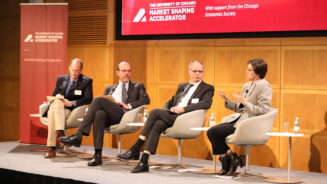Encouraging Market-Shaping Approaches to Global Problems

As the pandemic worsened in the United States, Ken Griffin worked with senior U.S. officials and championed the idea of early manufacture and production of vaccines and treatments to accelerate time to market. This extraordinary effort led to the development of a mass-produced, effective, and safe vaccine for COVID-19 in record time, saving hundreds of thousands-if not millions-of lives. The initiative also demonstrated the potential of an exciting but underused approach to innovation: the use of market-shaping approaches —such as advance market commitments, milestone payments, and competitive prizes—to catalyze private investment toward a public good.
Yet for all its potential, market-shaping approaches remain largely unused—in part because the knowledge required to design and launch these initiatives remains siloed among a handful of institutions and individuals, and in part because of a lack of design and advocacy efforts for multi-year market interventions. Despite its demonstrated success, the technique has not entered the “toolbox” of federal or other government agencies.
HOW IT WORKS
The market-shaping approach has played a vital role in a variety of recent advances. NASA uses milestone payments in its work with new private partners such as SpaceX. The Bill and Melinda Gates Foundation deployed an advanced market commitment to create a pneumococcal vaccine which to date has saved over 700,000 lives, and Stripe Climate used an advanced market commitment to develop new techniques for carbon capture. Griffin Catalyst has itself used market-shaping approaches, such as competitions and prizes, including in its work with The Michael J. Fox Foundation to speed the development of neuro-imaging to identify the presence of Parkinson’s disease.
Despite their differing goals, these achievements all share the same broad approach. First, public groups and private companies work collaboratively to identify a difficult but well-defined problem (getting a COVID-19 vaccine into people’s arms in less than twelve months, for example), define the terms of success, and, most importantly, introduce an economic incentive (such as an advance purchase commitment by the government or a philanthropy) to encourage the private sector to solve a challenge to the benefit of the larger public.
WHO WE’RE SUPPORTING
With a gift of $4.5 million — alongside Schmidt Futures and facilitated by the Digital Harbor Foundation – Griffin Catalyst recently supported the launch of a Market-Shaping Accelerator program at the University of Chicago, along with complementary activities to support the use of these approaches.
The program is led by Michael Kremer, University Professor in the Kenneth C. Griffin Department of Economics and joint winner of the 2019 Nobel Prize in Economics; Rachel Glennerster, the former Chief Economist at the Foreign Commonwealth & Development Office in the United Kingdom and former executive director of Jameel Poverty Action Lab at MIT; and by Christopher Snyder, the Joel Z. and Susan Hyatt Professor in Economics at Dartmouth College. Its programs are carried out in partnership with the Federation for American Scientists and the non-profit group 1Day Sooner.
The program pairs promising new proposals for applications of market-shaping ideas, starting with pandemic preparedness and climate, with winners receiving funding to continue to pursue their work. The program also supports and advises teams as they design their specific market-shaping mechanisms.
To this end, this initiative will also include a market-shaping course at the University of Chicago, accompanied by a Massive Open Online Course and associated open-source materials with global distribution, intended to inspire the next generation of market-shaping efforts.
WHY IT MATTERS
As the inspiring success of Operation Warp Speed demonstrated, market-shaping techniques hold promise for practical solutions to many of today’s most difficult and seemingly intractable problems. This initiative aims to widen the use and impact of market-shaping techniques, while also training policymakers to understand and support these underused tools.
The Market-Shaping Accelerator 2023 Innovation Challenge has already shown the importance of this goal. Beyond advancing society’s capacity to respond to future viral pandemics, Phase I winners— comprising 39 teams from 16 different countries worldwide —received support to develop clean generators for low- and middle-income countries, cost-effective respirators, and energy-efficient desalination systems, among others.
These approaches are also starting to get serious attention from the government. The U.S. Department of Energy recently announced $1 billion of funding for the use of this approach to promote clean hydrogen deployment, and the Biden administration announced Project NextGen, a $5 billion effort to “succeed Operation Warp Speed with a mission to develop next-generation vaccines and therapies,” per The Washington Post.
To drive solutions at scale to challenges facing communities around the world, investing in market-shaping mechanisms leverages enterprise and entrepreneurship to deliver meaningful solutions.
